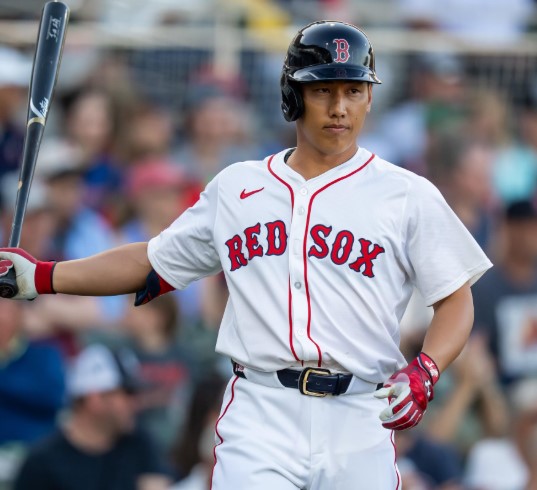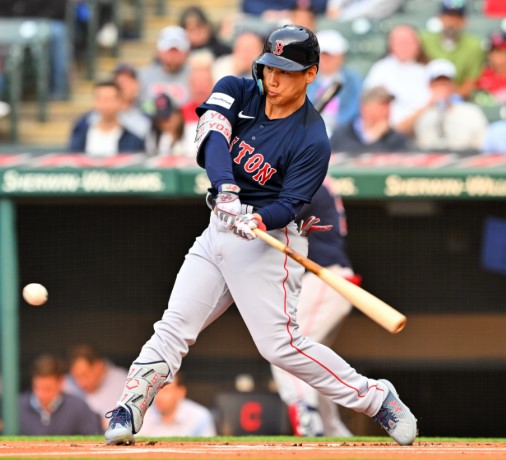GOOD NEWS: Masataka Yoshida Quietly Funds Free English Classes for Boston Immigrant Kids, Revealing He Once Cried Because He Couldn’t Understand His Teammates
Masataka Yoshida didn’t expect the silence to hurt so much.
When he first arrived in Boston, fresh off signing his contract with the Red Sox, Yoshida thought he was ready. He had prepared his swing, his body, his mind for the MLB grind. But he wasn’t prepared for the quiet moments in the locker room, when laughter roared across the space and he didn’t understand a single word, couldn’t join in, couldn’t even smile back convincingly.
And one evening, when his teammates cracked jokes he couldn’t grasp after a tough loss, Yoshida quietly slipped out of the clubhouse, found a corner in the tunnel at Fenway, and let tears roll down his face.
“I felt like I was on an island,” Yoshida would later admit to a close friend, who encouraged him to share this part of his journey. “I wanted to talk. I wanted to connect. I just… couldn’t.”

The hidden challenge
The Red Sox knew Yoshida’s bat would travel from Japan. What many didn’t realize was how much the language barrier would weigh on him emotionally. According to people close to Yoshida, he poured hours into English study, sitting with flashcards on team flights, scribbling notes in a small notebook he kept in his locker. He tried to memorize baseball terms, casual slang, even inside jokes. He would point at a coffee cup or a cleat, asking, “How you say this?”
And he made progress. Teammates noticed Yoshida’s grin getting wider, his responses coming quicker, the “Yes, yes” evolving into real conversation. But the journey was far lonelier than many knew.
“I’ve been in Boston a long time, and we’ve had guys from all over,” one Red Sox staffer said. “But with Masa, you could see he really wanted to belong.”
From personal pain to purpose
That’s why Yoshida’s latest gesture isn’t just another charity headline for a big-league player. This week, Yoshida quietly funded a program in partnership with local Boston immigrant centers to provide free English classes for immigrant children whose families recently moved to the U.S. The initiative will cover not only classroom instruction but also tutoring support, transportation stipends, and language resources for parents who want to learn alongside their kids.
In Yoshida’s words, it’s a way to ensure “no child has to feel the loneliness I once felt.”
The program will initially support 50 children in Boston’s Dorchester and East Boston neighborhoods, where immigrant families often juggle multiple jobs and struggle with integration barriers. Yoshida plans to expand the program if it shows promise, with the goal of creating a safe, supportive environment for kids to learn the language of their new home while still holding on to the pride of where they come from.
“It’s more than just words,” Yoshida said in a short statement released through his interpreter. “It’s about being able to laugh, to share, to understand when someone says, ‘Good job.’ It’s about feeling like you belong.”

A ripple through the clubhouse
Word of Yoshida’s gesture traveled quickly through the Red Sox clubhouse, drawing quiet respect from veterans and younger players alike.
“He didn’t have to do this,” said a Red Sox teammate. “A lot of us didn’t even know how hard it was for him. But that’s Masa, man. He’s got heart.”
For Yoshida, this isn’t a PR move. According to a friend, he visited the classrooms in plain clothes, sitting with the kids, reading English picture books with them. A local teacher shared that Yoshida stayed after class to talk to parents in broken English, using gestures and a few words, telling them they’re doing great and that he understands how hard it can be.
“He knelt down to talk to the kids eye-to-eye,” the teacher said. “They didn’t know he was a baseball star. They just knew he was kind.”
A reminder of what sports can be
Baseball is a game of numbers and performance, of WAR and OPS+, of exit velocity and ERA. But stories like Yoshida’s remind us that the game is also about the human heart. About how sports can connect people across language and borders, and how the pain of one player in a clubhouse can turn into hope for a child in a classroom.
The Red Sox signed Yoshida for what he could do on the field. But what he’s doing off the field might be the biggest swing of his career.
As Yoshida steps into the batter’s box this season, fans will see him adjust his gloves, take his practice swing, and lock in for the next pitch. But beyond the box score, there’s a story of a man who once sat in silence, aching for connection, and decided to turn that silence into something that speaks louder than words.
And maybe, somewhere in a small Boston classroom, a young child will learn to say, “Good job,” or “Thank you,” with the same smile Yoshida now shares with his teammates, understanding what it means, and feeling like they finally belong.
That’s a home run worth more than any stat line.